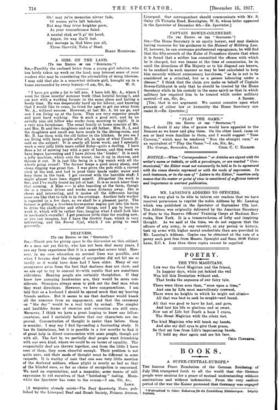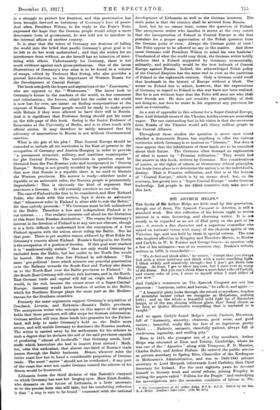BOOKS.
A SUPER.CENTRAREDROPE.* Ties famous Peace Resolution of the German Reichstag- of July 19th trumpeted forth to all the world that the German people were anxious for a peace of mutual understanding without annexations and without indemnities.- From the very earliest period of the war the Raiser protested that Germany was engages!'
• Winnationd in &Lau Baladung far diet Entwieklung Madam-pa. Leipzig Thaw, in a struggle to protect her frontiers, and this protestation has been brought forward as testimony of Germany's love of peace. And when President Wilson, in his reply to the Pope's Note, expressed the hope that the German people would adopt a more democratic form of government, he was told not to interfere in the internal affairs of another country.
It is clear that the rulers of Germany are desirous of lulling the world into the belief that paint's, Germany's great goal is to be left to do her work undisturbed ; and that she wishes for no interference from without, as she herself has no intention of inter- fering with others. Unfortunately for Germany, there is too much evidence against such pious professions. One of the latest illustrations of Germany's true alms is to be found in a volume of essays, edited by Professor Max Seeing, who also provides a general Introduction, on the Importance of Western Russia for the Development of Central Europe.
The book sets teeth the hopes and aspirations of the" Easterners," who are opposed to the "Westerners." The latter look to Germany's future in the markets of the world, to her commerce and colonization ; the former, afraid lest the outlet to the world is now lost for ever, are intent on finding compensations at the expense of Russia. These people would be ready to make peace with Britain if they were allowed to have their will in Russia. And it is significant that Professor Sering should put his name on the title-page of this book. Sering is the Senior Professor of Economics at the University of Berlin, and is in close touch with official circles. It may therefore be safely assumed that his advocacy of annexations in Russia is not without Governmental sanction.
What is the gist of his plea ? That Central Europe should be extended to include all the territories in the East at present in the occupation of Germany and Austria-Hungary in order to provide "a permanent economic, military, and maritime counterpoise" for he Central Powers. The territories in question must be liberated from the Pan-Russian yoke and incorporated in "Central Europe." Bering in not greatly troubled by the possible argument that now that Russia is a republic there is no need to liberate the Western provinces- His answer is ready—whether under a republic or an autocratic ruler, the Russian people is permanently Imperialistic I This is obviously the kind of argument that convinces a German. It will certainly convince no one else.
The caaeof Finland is the first to be considered, and Herr Richard Pohle, who deals with this section, lays it down as axiomatic that " whosoever rules in Finland is alone able to rule the Dottie." He then naively proceeds! "We Germans must be left unhindered in the Baltic. Therefore a free and independent Finland is to our interest. . . . Our roaliatic interests call aloud for the liberation of this State from Russiandomination." The reason for Germany's interest in the freedom of Finland is at any rate not obscure, though it is a little difficult to understand how the conception of a free Finland squares with the axiom about ruling the Baltic. But let that pass. There is yet another reason adduced by Herr Pohle for Germany's concern about Finland. Russia's final goal in the North is the occupation of a portion of Sweden. If this goal were reached it is "mathematically certain" that not only would Germany be excluded from the Baltic, but her outlet to the North Sea would be barred. She must thus free Finland in self-defence. "The same geo-political ' force which attracts our peaceful penetration over the Balkans towards the South-East and Turkey also draws us to the North-East over the Baltic provinces to Finland." In the South-East Germany will obtain rich harvests, and in the North- East German trade and capital will fall on virgin soil. Finland would, in the end, become the cornerstone of a Super-Central- Europe. Germany would have freedom of action in the Baltic. which for Northern Europe playa the same part as the Mediter- ranean for the Southern countries.
Precisely the same arguments support Germany's acquisition of Courland, Livonia, and Eathonia—Russia's Baltic provinoes. The anonymous writer who enlarges on this aspect of the subject holds that these provinces will offer scope for German colonization. German settlers will turn these lands into granaries for the Father. land, will help to snake Germany's hold on the Baltic more secure, and will enable Germany to dominate the Russian markets. The writer is carried away by his enthusiasm for his scheme to such a degree that he declares the soil of the said provinces capable of producing" almost all foodstuffs" that Germany needs, food- stuffs which heretofore she had to import from abroad Mark, too, cries this enthusiast, that almost one-third of Russia's trade peaces through the Baltic harbours. ' Hence, whoever rules; the entire coast-line has in hand a considerable proportion of German trade. The word " entire " should not be overlooked ; if any part of the coast-line were not under German control the scheme of his dream would be frustrated.
Lithuania forme the third division of this Naboth's vineyard on which Germany has east her longing eyes. Herr Erich Zechlin, who descants on the future of Lithuania, is a little uncertain no to the precise form this willAake, but his comforting reflection is that "a way is sure to be found" consonant with the national development of Lithuania as well as the German interests. The main point is that the country shall be severed from Russia.
Last, but by no means least, comes the question of Poland. The anonymous writer who handles it states at the very outset that the incorporation of Poland in Central Europe is the first postulate for a proper appreciation of the Polish question from the German point of view. Always the German point of view ! The Poles appear to be allowed no say in the matter. And these same Germans told President Wilson to mind his own business! Unashamed of what the world may think, the Gera= writer boldly declares that a Poland supported by Germany economically. militarily, and politically would be the best bulwark of Central Europe against Russia. Indeed, the acknowledged Polish policy of the Central Empires has the same end in view as the partitions of Poland in the eighteenth century. Only a German could recall that landmark in the history of Europe without a blush. The writer on Poland has to admit, however, that the expectations of Germany in regard to Poland in this war have not been realised. But he is not without hope that the Poles will soon see who their true friends are. He does not consider the possibility of their not doing so, nor does he snake In his argument any provision for such an eventuality.
As a sort of appendix to this scheme for a Super-Central-Europe, Herr Axel Schmidt treats of the Ukraine, but his views are somewhat vague. The one outstanding fact in his vision is that the severance from Russia of the Ukraine would add thirty million people to the Central Alliance.
Throughout these studies the question is never once raised whether a democratic Russia has anything to offer the various territories which Germany is so anxious to" liberate." Nor does it once appear that the inhabitants of these lands are to be consulted about their future. The Germans often demand an explanation of what is meant by "Prussian militarism." They would tied the answer in this book, written by Germans. Not considerations of justice, or the rights of others, or elementary ethical principles, but brute force alone is to determine the nation's, as the individual's, destiny. That is Prussian militarism, and that is at the bottom of "Central Europe," which is by no means dead, but, on the contrary, has grown into a " Super-Centml-Europe " under German leadership. Let people in the Allied countries duly take note of this fact.



































 Previous page
Previous page